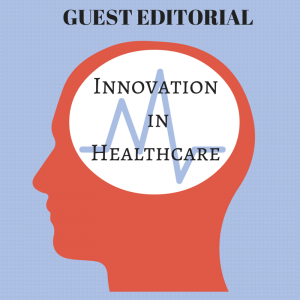This week’s Guest Opinion/Editorial comes Christopher Wynder is the Director of Client Services for ThinkDox.

Depending on the blog, survey, or new product review that you read “healthcare” is either: in a crisis caused by technology or is about to be saved by technology. In my opinion, whether technology is causing a crisis or is a savior is irrelevant- it is here to stay and it IS changing patient expectations and how end users want to work. The healthcare industry needs to innovate – but also it is naïve to not expect some failures (Google health anyone?).
Technology has no inherent positive or negative value. It can be disruptive and be a force for innovation but that does not equate to better. Innovation is not necessarily a net positive – by definition innovation is just a change to process or product that has never been done before.
Filling calamari rings with peanut butter and jelly is an innovation on calamari…..but I am not interested.
Should new technology be the goal of a hospital?
If you are a medical practice or a hospital – where your goal is to deliver healthcare at high quality and reasonable cost. The introduction of “technology” can feel like you are being dragged in directions that run counter to both quality and costs goals that have been the raison d’etre.
The problem is that the regulators, patients and even colleagues are all mandating/asking/pushing for “healthcare” to move into the 21st century. These drivers have every hospital administrator and practice manager rushing to purchase…..something.
You know you need technology but you want something that is proven yet inventive and healthcare specific. As an analyst, I can tell you this is the perfect storm for over-promise, under deliver. You are in a position where you have to buy something. All vendors need to do is convince you that they are your best chance at success. Think about that for a second- they know that you cannot take the time or apply the pressure to them to align the purchase with your business mandate.
So you buy a product, get the vendor to install it….and then it starts.
“No, it can’t do that without this module” [that you do not have]
“Well, that would be a customization. We can do it but you’ll have to use one of our certified systems integrators or lose product support.”
Now if you are a healthcare administrator and that sounds eerily familiar, I got news for you that is a conversation about between an ERP vendor and Mining company.
Here is what I know- the quality and “novelty” of a technology is not important when it comes to innovation. It is your ability to take advantage of what technology allows you to NOT do. That is the foundation of innovation.
So what does an individual hospital or practice do?
EMR and EHR deployments are the exemplar of the problem in healthcare. The technology has very slim use case- managing of structured records, but it has somehow been sold as the ONLY product that hospitals needs to manage patient information. This –ahem– creative marketing has led the technology to be seen as a net negative due to numerous issues that are being seen post implementation (decreased productivity, poor information security, etc). Electronic health/medical records purchases are not special-every application that handles information seems to be oversold and then poorly implemented nowadays.
The technology is not to blame – although I would say that vendors and their ecosystem have a large share of the blame. The root cause is a lack of project planning. The goal cannot be implementation of the technology that is merely a step (really important step) in the project.
Better results through goal not technology driven project planning
I am the Director of client services which means I help clients make technology decisions and manage the implementation. I start each project off by defining the client’s goals for the project. The technology doesn’t matter; archive software, ECM, Office 365, Compliance management – the implementation project is always about MORE the information management and user communication than the technical steps. The project plan as a whole is the same- only the technical steps change. The project plan needs to reflect the goals of the organization for how the technology will enable innovation and value.
My advice for hospital administrators, practice managers and CIOs – if a vendor or system implementer can’t/won’t share a general project plan that has a significant amount of non-technical steps-walk away. It would be nice if the vendors and their partner networks started to do this but that isn’t going to happen.
Protect yourself, get a project plan that includes organizational goals and task related to mapping user workflows, information security and user training- and stick to it. If the vendor does have one hire a project manager to be your pitbull to keep the vendor aligned to your project goals.
About the Author: Christopher (Chris) Wynder is the Director of Client Services for ThinkDox– an information management consulting and implementation firm. He provides information management strategy and implementation management services. You can find Chris on twitter (@ChrisW_thinkdox) and LinkedIn.






